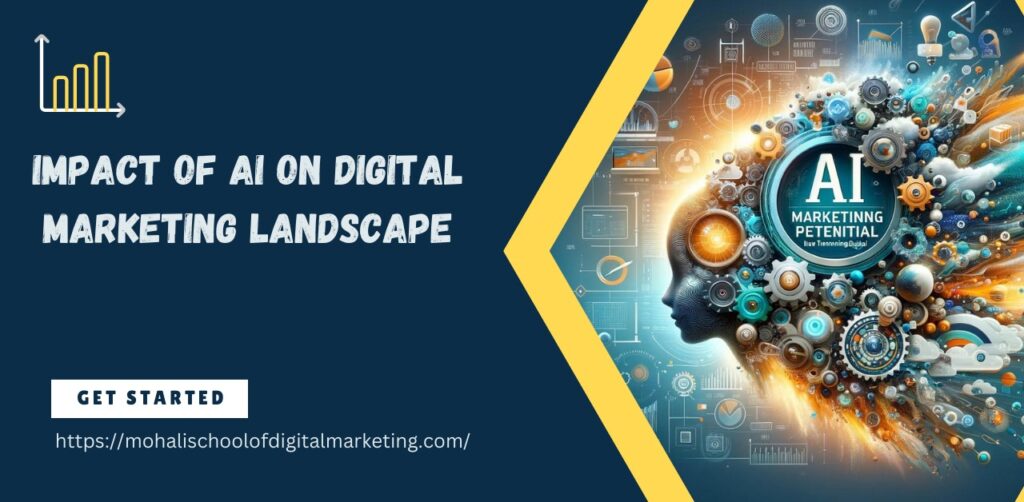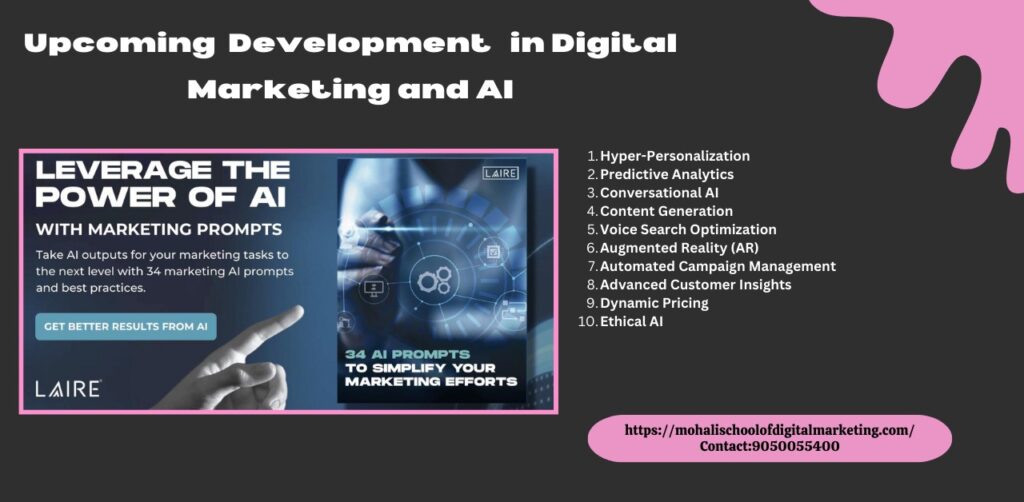A Rapid Growth of AI in Digital Marketing:-
One of the most significant technological developments of the twenty-first century has been the rapid expansion of artificial intelligence. AI in digital marketing is rapidly being driven by advances in algorithms, increased processing power, massive volumes of data, and broad applicability across multiple industries. Hence we come to know about the dynamic growth of AI in every field nowadays especially in digital marketing.

How AI enhances digital marketing:-
The role of artificial intelligence and digital marketing:-
Personalizing: is tailoring content and advertisements to individual user preferences based on data analysis.
Automation: entails streamlining processes such as ad management and client relations through chatbots.
Optimizing: Improving campaign performance with data-driven insights and real-time modifications.
Targeting: Using predictive analytics to achieve exact audience targeting and successful ad spend.
Involvement of AI in SEO and search algorithms
AI has a big impact on SEO and search engines.
Enhancing material Understanding: AI helps search engines understand the context and relevance of material.
Keyword Optimization: AI algorithms use trend analysis to identify and optimize high-performing keywords.
Future trends in AI and digital marketing
Digital marketing and AI’s upcoming trends include:
Hyper-Personalization: By leveraging extensive client data, advanced artificial intelligence will provide even more customized experiences and content.
Conversational AI: Sophisticated virtual assistants and chatbots will provide more complex, human-like interactions.
Predictive analytics: AI will increase the accuracy of forecasts of consumer behavior and market trends, enabling preemptive tactics.
AI-Driven Creation: AI technologies will produce and enhance content, including visual and video material, more effectively.
Voice and Visual Search: As AI advances in its ability to recognize patterns, more focus will be placed on optimizing for voice and visual searches.

Balancing AI and human creativity
AI Efficiency: Use AI to automate tasks, analyze data, and gain predictive insights to improve workflow and performance.
Using Human Originality: To create original, emotionally compelling content and keep your brand voice distinct, use human ingenuity.
Collaborative Method: To develop original and compelling marketing tactics, constitute human creativity with AI-driven insights.
Providing Ethical Monitoring Oversee AI-generated content and decisions with human judgment to uphold transparency and ethical norms.
This equilibrium improves marketing initiatives’ effectiveness and inventiveness.
Case studies and Real-World examples
Netflix: Increases user engagement and retention by using AI to provide personalized content recommendations based on viewing preferences.
Coca-Cola: Increases engagement and efficacy of advertising efforts by using AI to evaluate social media trends and adjust ads.
H&M: Uses AI to forecast trends and manage inventories, enhancing the effectiveness of the supply chain and balancing inventory levels with consumer demand.
Sephora: Uses chatbots and AI-powered virtual try-ons to provide individualized beauty experiences, increasing customer satisfaction and conversion rates.
The Washington Post: By using artificial intelligence (AI) (Heliograf) to produce regular news articles, writers are free to concentrate on deeper reporting.
Limitations and challenges of AI in marketing
The following are the primary obstacles and restrictions of AI in marketing:
Data Privacy Issues: Using AI to handle personal data presents privacy concerns as well as difficulties with regulatory compliance.
Fairness and Bias: AI has the potential to reinforce preexisting data biases, which could result in unfair or discriminating marketing strategies.
High Costs: Creating and deploying AI systems can be costly, especially for small companies.
Complexity and Integration: It might be difficult and need a high level of technical skill to integrate AI technologies with current systems and procedures.
Lack of Creativity: While AI is excellent at data-driven jobs, it may find it difficult to handle the subtle and creative parts of marketing that call for human intuition.
AI performance is dependent on both the quantity and quality of data, which might be a problem if the data is biased or incomplete.
!!CONCLUSION!!
Digital marketing has seen a dramatic transformation thanks to AI, which has improved personalization, automated processes, optimized content, and offered deeper insights. It helps marketers to increase productivity, present more pertinent and interesting experiences, and make data-driven choices. Although artificial intelligence (AI) has many benefits, it also has drawbacks, including potential biases and worries about data privacy. Leveraging AI’s full potential in digital marketing requires striking a balance between its capabilities and human inventiveness as well as ethical considerations.
